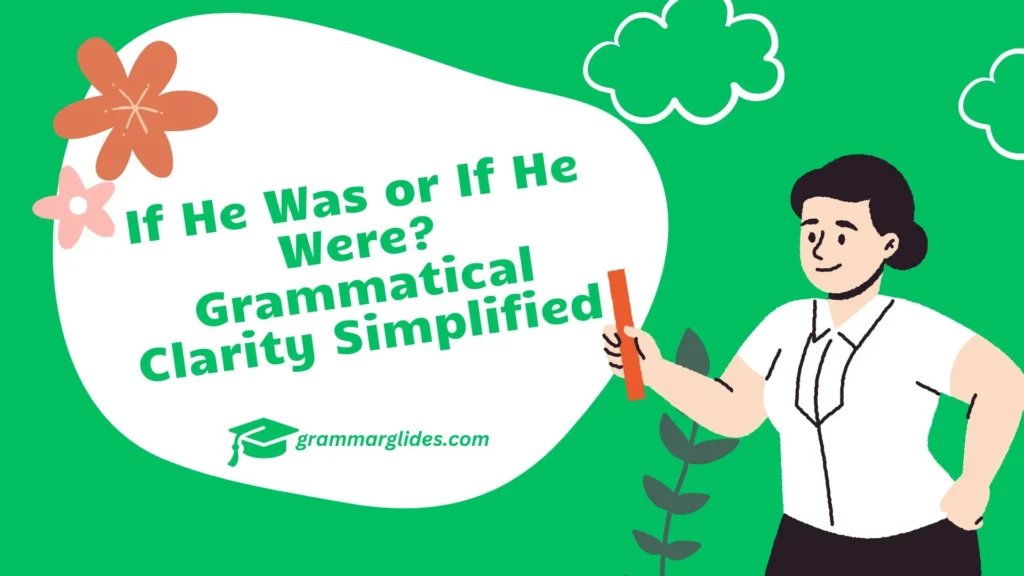“Master the subtle difference between ‘was’ and ‘were’ for confident and precise English grammar!”
Understanding the correct usage of “if he was” versus “if he were” can feel daunting, even for seasoned English speakers. These phrases highlight an essential difference in grammatical mood: indicative for stating facts and subjunctive for expressing hypotheticals or unreal scenarios. Recognizing when to use each adds polish and accuracy to your language skills.
To ensure your writing and speaking are consistently clear and correct, it’s important to master this subtle distinction. This blog aims to demystify the rules and nuances so you can confidently choose between “if he was” and “if he were.”
Let’s dive into clear examples, practical tips, and easy-to-remember rules that will simplify your grammar journey. By the end, you’ll not only understand the difference but also feel empowered to apply it correctly in professional, personal, and creative contexts.
Overview of “If He Was or If He Were”
This blog focuses on simplifying the difference between “if he was” and “if he were”, two common phrases that confuse even advanced English learners. It delves into their grammatical roots, explaining how the indicative mood relates to real situations and the subjunctive mood reflects hypothetical or unreal scenarios.
Understanding the Basics: Indicative vs. Subjunctive Mood
The indicative mood is used to discuss facts, statements, or events that are real or certain. For example:
- “If he was late, he must have had a reason.”

On the other hand, the subjunctive mood deals with unreal, hypothetical, or wishful scenarios. Example:
- “If he were taller, he could reach the top shelf.”
Key difference:
- Was applies to facts or situations that might have occurred.
- Were applies to unreal or hypothetical conditions.
Scenario: Indicative in Action
Imagine someone questioning an employee’s tardiness.
- “If he was stuck in traffic, it’s understandable.”
Here, the sentence implies a real possibility.
Scenario: Subjunctive in Action
Consider a basketball coach discussing a player’s height.
- “If he were taller, he could dunk effortlessly.”
This expresses a wishful thought about an unreal scenario.
Unraveling Conditional Sentences in English
Conditional sentences play a key role in understanding “was” vs. “were.” These sentences hinge on “if” clauses and express different possibilities:
- Real Conditional: Situations based on facts or likelihoods.
- Example: “If he was home, he would answer the door.”
- Unreal Conditional: Hypothetical or imagined scenarios.
- Example: “If he were the CEO, he would change the policy.”
Scenario: Differentiating Real from Unreal
- Real Conditional:
- “If he was at the event, he must have seen her.”
This implies the possibility that he attended.
- “If he was at the event, he must have seen her.”
- Unreal Conditional:
- “If he were at the event, he would have spoken to her.”
This implies he wasn’t at the event.
- “If he were at the event, he would have spoken to her.”
In the Morning vs On the Morning: Proper Usage Explained
Usage of “Was” and “Were” in Conditional Sentences
When to Use “Was” in Real Conditional Sentences
The word “was” is appropriate in conditional sentences when referring to something that could reasonably have happened.
Examples:
- “If he was feeling sick, he should have told us.”
- “If he was on the team last year, he played well.”
- “If he was honest, he would admit his mistake.”
Distinguishing “Were” in Unreal Conditional Scenarios
The word “were” is essential when expressing hypothetical or contrary-to-fact situations.
Examples:
- “If he were my boss, I’d ask for a raise.”
- “If he were a better cook, dinner wouldn’t have burned.”
- “If he were to visit tomorrow, it would be a surprise.”
The Past Tense Dilemma: Simplifying “Was” vs. “Were”
Understanding the past tense adds another layer to the “was” vs. “were” debate. While both refer to the past, their usage depends on the sentence’s mood and intent.
Scenario: Clarifying Past Context
- “If he was here yesterday, he saw the announcement.” (Real past event)
- “If he were here yesterday, he would have seen the announcement.” (Imagined scenario in the past)
Clear Examples That Illustrate the Difference
The distinction between “if he was” and “if he were” is rooted in whether the situation is real (indicative) or hypothetical (subjunctive). Below is a table that clearly illustrates the difference with examples for each context:
| Context | Mood | Example Sentence | Explanation |
| Real Situation | Indicative | “If he was at the office, he must have seen the memo.” | Implies a possible fact; he might actually have been at the office. |
| Unreal Hypothetical | Subjunctive | “If he were at the office, he would have handled the issue.” | Implies he wasn’t at the office but imagines what could happen if he were. |
| Past Real Event | Indicative | “If he was late yesterday, he likely had a good reason.” | Refers to a real event in the past, where his lateness is plausible. |
| Contrary to Fact | Subjunctive | “If he were late yesterday, it would have surprised everyone.” | Indicates he wasn’t late, but imagines an unreal scenario. |
| Wishful Thinking | Subjunctive | “If he were taller, he could play basketball better.” | Hypothetical wish, imagining a different reality. |
| Factual Question | Indicative | “If he was the person who called, we should confirm his details.” | Questions a real situation, implying it might have happened. |
| Imaginary Scenario | Subjunctive | “If he were the one who called, we would already know the details.” | Imagines an unreal scenario where he is the caller. |
Applying the Rule: Tips for Remembering When to Use “Were” and “Was”
- Real or Hypothetical? Ask yourself if the sentence deals with reality or imagination.
- Third-Person Hypotheticals: Always use “were” for unreal scenarios, regardless of the subject.
- Practice with Common Scenarios: Replace “if” clauses with wishes to identify the subjunctive mood.
Examples:
- “If he was tired, he went to bed early.”
- “If he were tired, he wouldn’t be working now.”
- “If he was excited, he’d have called by now.”
Common Mistakes to Avoid in Your Writing
- Interchanging “was” and “were” indiscriminately.
Incorrect: “If he was you, he’d understand.”
Correct: “If he were you, he’d understand.” - Ignoring context. Ensure the sentence reflects whether the scenario is real or hypothetical.
Example: “If he were the manager, things would improve.”
The Importance of Context in Choosing Between “Was” and “Were”
Context is everything. Your choice between “was” and “were” depends on whether you’re describing a factual situation or an imagined one.
Examples:
Professional Writing Insights
- Real: “If he was qualified, he would have received the job.”
- Unreal: “If he were qualified, he’d have a better chance.”
- Factual Hypothetical: “If he were applying, I’d endorse him.”
Professional Writing Insights: Enhancing Clarity in Your Text
When it comes to professional writing, using “if he was” and “if he were” correctly can greatly enhance the clarity and precision of your text. Misusing these phrases might confuse your readers, particularly in formal settings where attention to detail is paramount. Below are some actionable tips to ensure your writing remains clear and effective:
1. Understand the Context
- Use “if he was” for real or factual conditions, as in discussing something that might have happened or is likely to be true.
- Use “if he were” for hypothetical or imagined scenarios, particularly in formal writing.
2. Match Mood to Purpose
- In professional documents like reports or emails, correctly distinguishing between the indicative mood (real situations) and the subjunctive mood (hypothetical situations) adds credibility. For example:
- Indicative: “If he was present at the meeting, we need his input.”
- Subjunctive: “If he were in charge, the results would have been different.”
3. Use Parallel Structure
- Maintain consistency in tone and grammatical structure within sentences. For example:
- Clear: “If he were to lead the team, morale would improve.”
- Ambiguous: “If he was leading, morale would improve.”
4. Keep the Reader in Mind
- Always consider how your audience might interpret your writing. Misplaced usage can alter the meaning of your message, particularly in instructions, contracts, or formal communication.
5. Practice with Scenarios
Practice writing sentences in different moods and contexts to internalize these rules. For example:
- “If he was on the call, we should have recorded his input.” (Real situation)
- “If he were available now, we could proceed with the decision.” (Hypothetical scenario)
FAQs
1. What is the subjunctive mood in English?
The subjunctive mood expresses wishes, hypotheticals, or conditions contrary to fact, often requiring “were” for third-person singular subjects.
2. Can “was” and “were” be used interchangeably?
No, their use depends on whether the sentence is real (indicative) or hypothetical (subjunctive).
3. Why does “were” apply to unreal situations?
“Were” is the standard form for hypothetical or contrary-to-fact conditions, even with singular subjects.
4. How can I test if “was” or “were” fits my sentence?
Ask whether the sentence deals with fact or imagination. If it’s imagined or unreal, use “were.”
5. Are there exceptions to these rules?
In casual conversation, “was” is sometimes used for hypotheticals, but in formal writing, stick to “were” for subjunctive scenarios.
Wrap-Up
Mastering the difference between “if he was” and “if he were” enhances your grammatical precision and writing clarity. Whether you’re writing professional emails, crafting essays, or engaging in creative storytelling, the choice between these forms reflects your command of English.
By focusing on the indicative versus subjunctive mood, analyzing context, and practicing with examples, you can easily apply these rules. Remember, while grammar can seem tricky, understanding these nuances empowers your communication. Stay mindful, and let practice lead the way to fluency!

Hi! I’m Lauren Reynolds, the author of Grammar Glides. I create easy-to-follow content that helps you master English with confidence. Let’s make learning English simple and enjoyable together!

